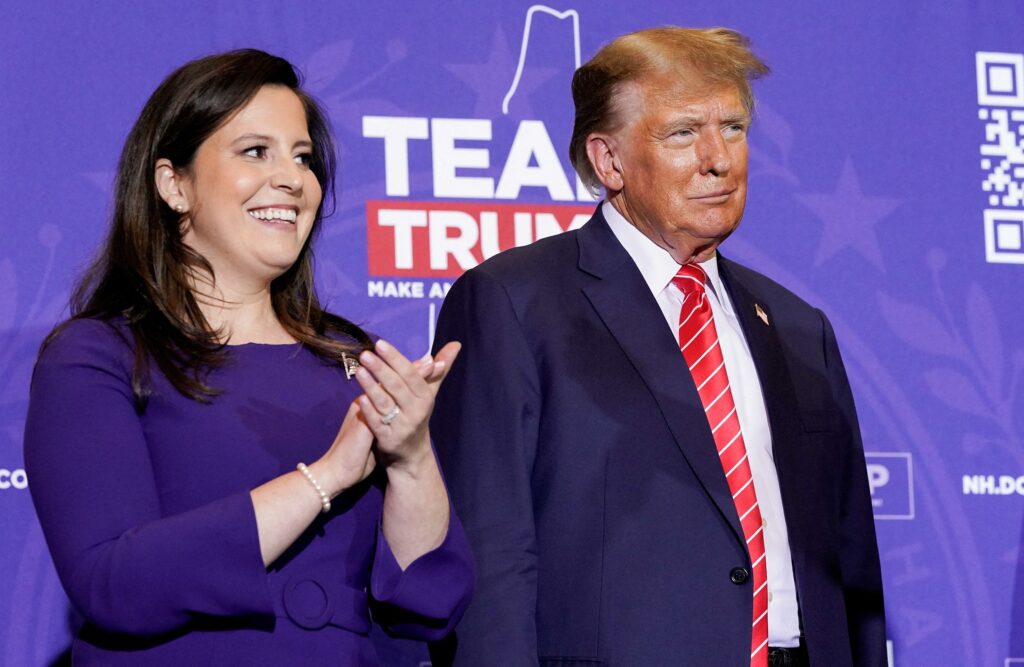Elise Stefanik’s swift rise was a barometer of the power of Trumpism.
But a sudden interruption in her ascent reveals warning signs for the White House and caps a tough week in which the inevitable reverberations of President Donald Trump’s political shock therapy began to threaten his agenda.
Trump withdrew Stefanik’s nomination to serve as US ambassador to the United Nations on Thursday, indicating concern about a special election in her seat given the already-tiny Republican majority in the House.
It was a bitter blow for the New York Republican that will deprive her of a platform she could have used to speak for Trump’s “America first” policies and to build her own profile ahead of a possible tilt at even higher office in years to come. It was also a poor reward for her loyalty to the president and her journey away from mainstream Republicanism, which critics say suppressed principle for ambition. Trump promised Stefanik would be returned to the House GOP leadership after giving up her No. 3 spot and suggested she may get an administration post down the road.
But the setback for Stefanik was a rare admission by the president that even his trademark brashness and zeal for unchecked power cannot always supersede political logic. And his reversal on Stefanik is a sign of political vulnerability only two months into his already-turbulent second term.
Democrats might be flailing in response to Trump’s shock-and-awe return to the Oval Office. And the GOP is still rock-solid behind a president who uses intimidation to enforce party loyalty. But he is not immune from political gravity. And he just endured a nightmare week in which several potentially damaging political crises were directly attributable to his approach and strategy.
Trump’s growing challenges
The White House is still trying to quell the controversy over secret details of pending military strikes in Yemen posted by Defense Secretary Pete Hegseth on a group chat that mistakenly included a journalist. The episode made Trump’s national security team look like amateurs and highlighted the risks of picking senior officials who lack experience but look good on TV and share their boss’s disruptive tendencies.
There are also signs that Elon Musk’s purge of the federal government is beginning to create confusion that could threaten vital services and cause a political backlash. The Social Security Administration backtracked on another reform measure as staff cuts imposed by the Department of Government Efficiency caused long waits at agency offices and scared benefits recipients.
Another signature Trump initiative — his vow to quickly end the war in Ukraine — is also foundering. The White House claimed it had forged a maritime ceasefire in the Black Sea after talks in Saudi Arabia on Monday. But the deal came with Russian demands for the lifting of banking and agricultural sanctions that Europe wants to maintain. Even Trump, who has been bombastically predicting that his friendship with President Vladimir Putin would bring peace, admitted the Russians might be “dragging their feet.”
The economy is also looking dicey. New data this week showed consumer confidence at its lowest level since January 2021. Americans expect higher inflation this year, and increasing numbers think a recession is coming, according to the latest Conference Board survey.
The gloom may reflect the impact of the president’s erratic implementation of tariff policies that are likely to increase prices and Trump’s own lack of focus on the costs of groceries and housing, which helped him win the election.
Economic analysts predicted Thursday that newly imposed tariffs on auto imports — including from Canada and Mexico, with which the US car industry is deeply integrated — could push up the cost of new vehicles by thousands of dollars. Their warnings captured the risk Trump is taking with the economy. His policies create even more pain for cash-strapped consumers in the short and medium term in return for an idealized view of a new “golden age” based on a manufacturing renaissance at some unspecified period in the future.
“We’re going to charge countries for doing business in our country and taking our jobs, taking our wealth, taking a lot of things that they’ve been taking over the years,” Trump said in the Oval Office on Wednesday. “They’ve taken so much out of our country, friend and foe. And frankly, friend has been often times much worse than foe.”
The president will take a further risk with consumer confidence next week with his promised reciprocal dollar-for-dollar tariffs against foreign nations that impose duties on US goods. If this hikes prices, as many experts expect, all eyes will be on whether Trump is willing to stay the political course.



